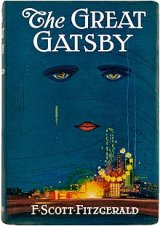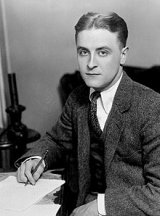The Great Gatsby Page #4
The Great Gatsby is a 1925 novel by American writer F. Scott Fitzgerald. Set in the Jazz Age on Long Island, near New York City, the novel depicts first-person narrator Nick Carraway's interactions with mysterious millionaire Jay Gatsby and Gatsby's obsession to reunite with his former lover, Daisy Buchanan. The novel was inspired by a youthful romance Fitzgerald had with socialite Ginevra King, and the riotous parties he attended on Long Island's North Shore in 1922
and—” After an infinitesimal hesitation he included Daisy with a slight nod, and she winked at me again. “—And we’ve produced all the things that go to make civilization—oh, science and art, and all that. Do you see?” There was something pathetic in his concentration, as if his complacency, more acute than of old, was not enough to him any more. When, almost immediately, the telephone rang inside and the butler left the porch Daisy seized upon the momentary interruption and leaned towards me. “I’ll tell you a family secret,” she whispered enthusiastically. “It’s about the butler’s nose. Do you want to hear about the butler’s nose?” “That’s why I came over tonight.” “Well, he wasn’t always a butler; he used to be the silver polisher for some people in New York that had a silver service for two hundred people. He had to polish it from morning till night, until finally it began to affect his nose—” “Things went from bad to worse,” suggested Miss Baker. “Yes. Things went from bad to worse, until finally he had to give up his position.” For a moment the last sunshine fell with romantic affection upon her glowing face; her voice compelled me forward breathlessly as I listened—then the glow faded, each light deserting her with lingering regret, like children leaving a pleasant street at dusk. The butler came back and murmured something close to Tom’s ear, whereupon Tom frowned, pushed back his chair, and without a word went inside. As if his absence quickened something within her, Daisy leaned forward again, her voice glowing and singing. “I love to see you at my table, Nick. You remind me of a—of a rose, an absolute rose. Doesn’t he?” She turned to Miss Baker for confirmation: “An absolute rose?” This was untrue. I am not even faintly like a rose. She was only extemporizing, but a stirring warmth flowed from her, as if her heart was trying to come out to you concealed in one of those breathless, thrilling words. Then suddenly she threw her napkin on the table and excused herself and went into the house. Miss Baker and I exchanged a short glance consciously devoid of meaning. I was about to speak when she sat up alertly and said “Sh!” in a warning voice. A subdued impassioned murmur was audible in the room beyond, and Miss Baker leaned forward unashamed, trying to hear. The murmur trembled on the verge of coherence, sank down, mounted excitedly, and then ceased altogether. “This Mr. Gatsby you spoke of is my neighbour—” I began. “Don’t talk. I want to hear what happens.” “Is something happening?” I inquired innocently. “You mean to say you don’t know?” said Miss Baker, honestly surprised. “I thought everybody knew.” “I don’t.” “Why—” she said hesitantly. “Tom’s got some woman in New York.” “Got some woman?” I repeated blankly. Miss Baker nodded. “She might have the decency not to telephone him at dinner time. Don’t you think?” Almost before I had grasped her meaning there was the flutter of a dress and the crunch of leather boots, and Tom and Daisy were back at the table. “It couldn’t be helped!” cried Daisy with tense gaiety. She sat down, glanced searchingly at Miss Baker and then at me, and continued: “I looked outdoors for a minute, and it’s very romantic outdoors. There’s a bird on the lawn that I think must be a nightingale come over on the Cunard or White Star Line. He’s singing away—” Her voice sang: “It’s romantic, isn’t it, Tom?” “Very romantic,” he said, and then miserably to me: “If it’s light enough after dinner, I want to take you down to the stables.” The telephone rang inside, startlingly, and as Daisy shook her head decisively at Tom the subject of the stables, in fact all subjects, vanished into air. Among the broken fragments of the last five minutes at table I remember the candles being lit again, pointlessly, and I was conscious of wanting to look squarely at everyone, and yet to avoid all eyes. I couldn’t guess what Daisy and Tom were thinking, but I doubt if even Miss Baker, who seemed to have mastered a certain hardy scepticism, was able utterly to put this fifth guest’s shrill metallic urgency out of mind. To a certain temperament the situation might have seemed intriguing—my own instinct was to telephone immediately for the police. The horses, needless to say, were not mentioned again. Tom and Miss Baker, with several feet of twilight between them, strolled back into the library, as if to a vigil beside a perfectly tangible body, while, trying to look pleasantly interested and a little deaf, I followed Daisy around a chain of connecting verandas to the porch in front. In its deep gloom we sat down side by side on a wicker settee. Daisy took her face in her hands as if feeling its lovely shape, and her eyes moved gradually out into the velvet dusk. I saw that turbulent emotions possessed her, so I asked what I thought would be some sedative questions about her little girl. “We don’t know each other very well, Nick,” she said suddenly. “Even if we are cousins. You didn’t come to my wedding.” “I wasn’t back from the war.” “That’s true.” She hesitated. “Well, I’ve had a very bad time, Nick, and I’m pretty cynical about everything.” Evidently she had reason to be. I waited but she didn’t say any more, and after a moment I returned rather feebly to the subject of her daughter. “I suppose she talks, and—eats, and everything.” “Oh, yes.” She looked at me absently. “Listen, Nick; let me tell you what I said when she was born. Would you like to hear?” “Very much.” “It’ll show you how I’ve gotten to feel about—things. Well, she was less than an hour old and Tom was God knows where. I woke up out of the ether with an utterly abandoned feeling, and asked the nurse right away if it was a boy or a girl. She told me it was a girl, and so I turned my head away and wept. ‘All right,’ I said, ‘I’m glad it’s a girl. And I hope she’ll be a fool—that’s the best thing a girl can be in this world, a beautiful little fool.’ “You see I think everything’s terrible anyhow,” she went on in a convinced way. “Everybody thinks so—the most advanced people. And I know. I’ve been everywhere and seen everything and done everything.” Her eyes flashed around her in a defiant way, rather like Tom’s, and she laughed with thrilling scorn. “Sophisticated—God, I’m sophisticated!” The instant her voice broke off, ceasing to compel my attention, my belief, I felt the basic insincerity of what she had said. It made me uneasy, as though the whole evening had been a trick of some sort to exact a contributory emotion from me. I waited, and sure enough, in a moment she looked at me with an absolute smirk on her lovely face, as if she had asserted her membership in a rather distinguished secret society to which she and Tom belonged. ------------------------------------------------------------------------ Inside, the crimson room bloomed with light. Tom and Miss Baker sat at either end of the long couch and she read aloud to him from the
Translation
Translate and read this book in other languages:
Select another language:
- - Select -
- 简体中文 (Chinese - Simplified)
- 繁體中文 (Chinese - Traditional)
- Español (Spanish)
- Esperanto (Esperanto)
- 日本語 (Japanese)
- Português (Portuguese)
- Deutsch (German)
- العربية (Arabic)
- Français (French)
- Русский (Russian)
- ಕನ್ನಡ (Kannada)
- 한국어 (Korean)
- עברית (Hebrew)
- Gaeilge (Irish)
- Українська (Ukrainian)
- اردو (Urdu)
- Magyar (Hungarian)
- मानक हिन्दी (Hindi)
- Indonesia (Indonesian)
- Italiano (Italian)
- தமிழ் (Tamil)
- Türkçe (Turkish)
- తెలుగు (Telugu)
- ภาษาไทย (Thai)
- Tiếng Việt (Vietnamese)
- Čeština (Czech)
- Polski (Polish)
- Bahasa Indonesia (Indonesian)
- Românește (Romanian)
- Nederlands (Dutch)
- Ελληνικά (Greek)
- Latinum (Latin)
- Svenska (Swedish)
- Dansk (Danish)
- Suomi (Finnish)
- فارسی (Persian)
- ייִדיש (Yiddish)
- հայերեն (Armenian)
- Norsk (Norwegian)
- English (English)
Citation
Use the citation below to add this book to your bibliography:
Style:MLAChicagoAPA
"The Great Gatsby Books." Literature.com. STANDS4 LLC, 2025. Web. 23 Feb. 2025. <https://www.literature.com/book/the_great_gatsby_1598>.








Discuss this The Great Gatsby book with the community:
Report Comment
We're doing our best to make sure our content is useful, accurate and safe.
If by any chance you spot an inappropriate comment while navigating through our website please use this form to let us know, and we'll take care of it shortly.
Attachment
You need to be logged in to favorite.
Log In